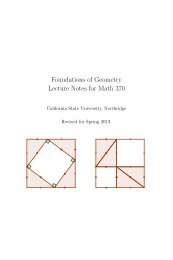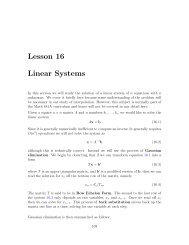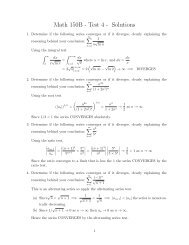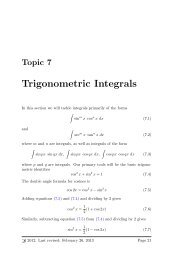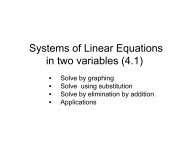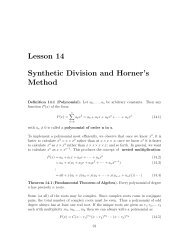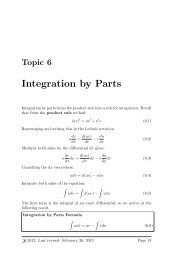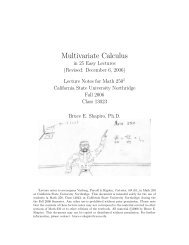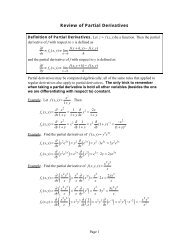The Computable Differential Equation Lecture ... - Bruce E. Shapiro
The Computable Differential Equation Lecture ... - Bruce E. Shapiro
The Computable Differential Equation Lecture ... - Bruce E. Shapiro
Create successful ePaper yourself
Turn your PDF publications into a flip-book with our unique Google optimized e-Paper software.
CHAPTER 1. CLASSIFYING THE PROBLEM 13<br />
<strong>The</strong>n we have<br />
F (t, y, z) = 0 (1.73)<br />
but the Jacobian matrix becomes nonsingular:<br />
∂F (t, y, z)<br />
∂(y, z)<br />
=<br />
( ) I 0<br />
0 0|<br />
(1.74)<br />
<strong>The</strong> general theory of differential algebraic equations is still being developed. A<br />
system of the form<br />
Ay ′ (t) + By(t) = f(t) (1.75)<br />
where A and B are square matrices and A is singular, is called a linear constant<br />
coefficient DAE. If the determinant<br />
det λA + B ≠ 0 (1.76)<br />
is not identically zero (considered as a function of the variable λ), then 1.75 is<br />
solvable.<br />
1.6 Delay <strong>Differential</strong> <strong>Equation</strong>s<br />
Definition 1.8. (Functional differential equation) If a differential systems can be<br />
written explicitly as a function of a function of the abscissa variable, noteably<br />
y ′ = f(t, y(t), y(u(t)) (1.77)<br />
then it is know as a functional differential equation (FDE). If the it can be<br />
written as<br />
y ′ = f(t, y(t), y(t − τ 1 , t − τ 2 , . . . )) (1.78)<br />
then it is known as a delay differential equation (DDE).<br />
Example 1.8. A typical functional differential equation is<br />
A typical DDE is given by<br />
y ′ = y(t) + y(sin(t)) (1.79)<br />
y ′ = y(t) + y(t − 3) + 7y(t − 5) (1.80)<br />
DDEs arise frequently in control theory and population growth. <strong>The</strong> theory of<br />
functional differential equations is not as well advanced as other types of DEs and<br />
there are fewer numerical methods for solving them. <strong>The</strong> best understood functional<br />
equations are delay equations. Delay equations are similar to initial value problems,<br />
in that the value of the function must be known at the starting point. <strong>The</strong>y are<br />
more complicated, however, in that the value must also be known over an entire<br />
interval preceding t 0 , of duration given by the greatest delay in the equation. Thus<br />
c○2007, B.E.<strong>Shapiro</strong><br />
Last revised: May 23, 2007<br />
Math 582B, Spring 2007<br />
California State University Northridge




